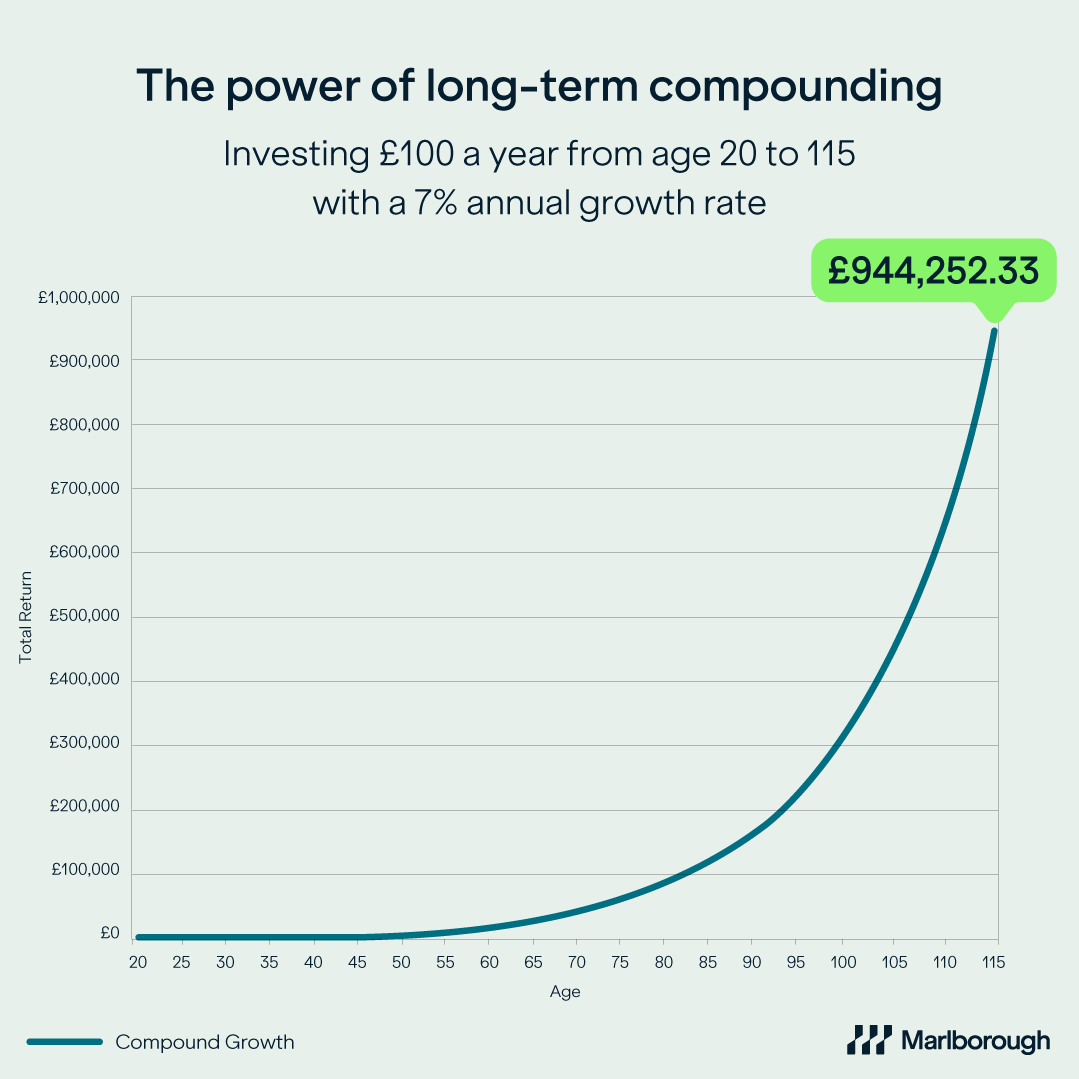Chart of the Week: Time After Time – how £100 a year can turn into a fortune

For professionals only.
Capital at risk.
Welcome to this week's 'Chart of the Week', where we share key market insights to help keep you informed on what's happening in the markets.
Those of you who know me will know that I like to spend my free time down at the allotment. There’s something quietly rewarding about growing your own fruit and veg – sowing the seeds, tending the soil and eventually reaping what you’ve nurtured. You might think of it as a pastime for the older generation, but I’d argue it’s one of the secrets to a long and healthy life: staying active, social and grounded in something that takes time and patience.
Speaking of longevity, a British woman, 115-year-old Ethel Caterham, has just become the world’s oldest person, following the death of a Brazilian nun. When Ethel celebrated her birthday last year at a care home in Lightwater, Surrey, she brushed off attention by saying she "didn’t know what all the fuss was about." Her secret? "Never arguing with anyone".
It’s a simple idea, but one with a powerful message. Mastering your emotions – whether in life or in investing – is often the difference between success and failure.
To put her extraordinary life in perspective, she started work at 20 and retired at 66. That means she worked for 46 years, just 40% of her lifetime. The other 60%? That will have required careful financial planning, whether through savings, pensions or investments.
This is exactly why financial advice matters. Because, as I often say, investing is a lifelong journey – and like gardening, the secret to long-term success is consistency and staying the course, even when conditions are tough.
Let’s imagine Ethel invested £100 annually from the age of 20, putting it in a global equity fund with an average return of 7% per annum. By the time she turned 115, that modest annual contribution would have grown to nearly £950,000.

This simple example shows the extraordinary power of compounding – what Einstein is credited with calling the ‘eighth wonder of the world’. But it also highlights something deeper, the importance of being emotionally resilient and riding out volatility. Ethel has lived through a series of dramatic market events. Had she invested in the way we’re talking about, she might have been sorely tempted to sell-out of the market during some of them. But the trick is to remember (as we’ve highlighted before) that historically bull markets have lasted longer than bear markets and the gains have significantly outweighed any temporary falls.
Major market events in Ethel’s lifetime:
• The Great Depression (1929–1939) – US equities fell 90%.
• World War II (1939–1945) – Economic devastation followed by recovery.
• OPEC Oil Crisis (1973–1974) – Stagflation and market volatility.
• Black Monday (1987) – Markets crashed 22% in a day.
• Dot-com bubble burst (2000–2002) – $5 trillion wiped off stock markets.
• Global Financial Crisis (2007–2009) – Lehman collapse, mass panic.
• COVID-19 Crash (2020) – Sharp drop, fast recovery.
• Russia-Ukraine War (2022–date) – Energy shocks, inflation, risk repricing.
Key takeaway: Our chart shows the power of compounding. It demonstrates how time in the market beats timing the market. Staying the course – emotionally and financially – is likely to be the most rewarding strategy. We just need to keep planting our seeds, stay emotionally grounded and trust that, over time, the results will come.
Find out more about our multi-asset solution
This article is provided for general information purposes only and should not be construed as personal financial advice to invest in any fund or product. These are the investment manager’s views at the time of writing and should not be construed as investment advice. The opinions expressed are correct at time of writing and may be subject to change. Capital is at risk. The value and income from investments can go down as well as up and are not guaranteed. An investor may get back significantly less than they invest. Past performance is not a reliable indicator of current or future performance and should not be the sole factor considered when selecting funds.




